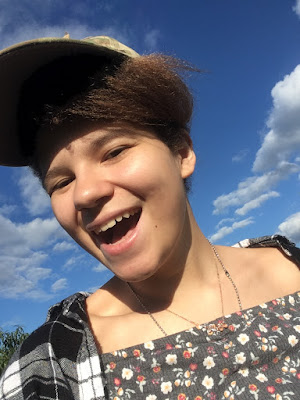 |
| Eileen Myles |
Evolution by
Eileen Myles, Grove Press, New York, 222 pages, $23.00.
REVIEW BY ED MEEK
Eileen Myles is the rarest of birds: a celebrity poet. She
is well-known, partly by her associations. She hung out with Ginsberg and
Berrigan back in the sixties, and in the recent past, she was girlfriends with Jill
Soloway, the writer and producer of Transparent
(a character on the show was modeled on Myles). A couple of her poems were
quoted on the show. Myles wrote an essay about getting paid to write poetry in
which she talks about having to ask for money for the poetry used on the show.
She also talks about selling a poem in exchange for a room at an inn in North
Carolina. Good deal.
Although Myles was born in Cambridge and went to Catholic
school in Arlington, she is a New Yorker by temperament and she has that
openness in her writing that you will experience if you happen to engage a New
Yorker in conversation. A recent piece in the New York Times by Irish transplant Maeve Higgins lamented that in
America, there’s no small talk. What she meant was in New York. New Yorkers
will jump right in and tell you anything. Myles’ writing is like that. In some
cases, this is good because the writer appears both vulnerable and likeable. In
other case it can get self-indulgent and narcissistic.
I became an Eileen Myles fan when I read her poem “An
American Poem” in which she responds to people in New York, who, upon learning
she is from Boston, want to know if she is related to the Kennedys. In the poem,
Myles writes as if she is indeed, a reluctant member of the Kennedy clan:
I was born in Boston in
1949. I never wanted
this fact to be known, in
fact I’ve spent the better
half of my adult life
trying to sweep my early
years under the carpet
and have a life that
was clearly just mine
and independent of
the historic fate of
my family.
She goes on from there and ends the
poem like this:
It is not normal for
me to be a Kennedy.
But I am no longer
ashamed, no longer
alone. I am not
alone tonight because
we are all Kennedys.
And I am your President.
So it is witty and very informal
but fresh and inventive. If you haven’t read the rest of the poem, it is
available for free online at the Poetry Foundation site.
Chelsea Girls, a fiction/memoir by Myles is also
worth reading, particularly if you are from the Boston area. She starts it with
this story about her friend being arrested at a party. Myles chases the
arresting officer out of the house and jumps on his back. When she is
handcuffed, she tells the police, you can’t arrest me, I’m a poet.
I have a copy of Myles’ new book, Evolution, two hundred pages of mostly
poems and a couple of essays. One of the fears of poets and I imagine, all
writers, is that you’ll reach a certain age and you’ll run out of gas; like an
athlete, you just won’t have it anymore. Stephen King once said that the
problem with being famous is that you’ll drink your own Kool-Aid and believe
everything you write is good because you wrote it. In Evolution, Myles suffers from both of these problems. Here’s the
beginning of the first poem in the book:
Something
unearthly
about
today
so I buy
a diet coke &
a newspaper
a version of “me”
something
about me on the
earth & its sneakers
& feeling like
the earth’s furniture
Is this poetry or a journal entry?
Is it interesting? She is writing about being famous I guess. Five pages later
the poem ends:
….And
something
new starts
up in
my building
a different
sound.
Myles is using the line breaks with
one, or two word lines to create surprise but really there just isn’t much
going on here. I was looking forward to reading Evolution but I could have made better use of my time by say,
cleaning my room or taking a nap. You just never know what you’ll run into
today when it comes to poetry. There is no reliable magazine or journal or
website that you can go to and find good writing. I suppose it is like this in
any given age. It is only after we’re dead and our descendants have sifted
through the rubble that they will figure out who the Emily D and Walt W of our
age was.







































